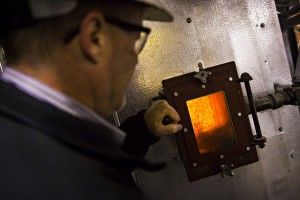Bill establishes new subsidy for biomass power plants
Legislators seek to establish a Greenhouse Gas Reduction Fund, which would be funded by the cap and trade program adopted by the California Air Resources Board under AB32, and appropriate those dollars to the California Energy Commission to subsidize biomass power generation in the state.
Assembly Bill 590, authored by Assemblymembers Brian Dahle, R-Bieber, and Rudy Salas, D-Bakersfield, passed the Assembly unanimously last month with bipartisan support. The bill aims to add incentives so that agriculture and forest waste can be used to create energy through biomass facilities.
“Biomass” describes multiple sources of fuel, such as trees, waste from construction, wood and agriculture (corn husks, rice hulls, peanut shells, etc.), fuel crops and even sewage sludge and manure. According to the EPA, since biomass deals with energy sources that would otherwise be considered waste, but will “continue to be produced by society,” it is considered a renewable resource.
California is home to some 132 biomass facilities with a total gross capacity of 985 MW. The California Energy Commission reported that, in 2014, “6,572 gigawatt hours of electricity in homes and businesses was produced from biomass” – that translates to 3.33 percent of the total electricity production in California.
In addition to energy conversion, biomass production helps prevent wildfires by removing forest waste and disposing it in a controlled facility.
During a Senate committee hearing on Wednesday, Assemblyman Dahle pointed to “catastrophic wildfires” that are “burning up and destroying our watersheds, our wildlife and emitting carbon.” Decayed forests also emit methane, another greenhouse gas that contributes to climate change.
But biomass plants are struggling to stay operative in California. The bill, according to Dahle, “sets a policy in place that biomass is very important to California and the energy industry” and brings state funding to help offset facility and treatment costs. He emphasized that AB590 is not about “opening up new plants” but “trying to keep the ones that we have available, running.”
Julie Malinowski-Ball, a spokeswoman for the California Biomass Energy Alliance, a sponsor of the bill, said it was vital to “ensure these facilities can operate long into the future.” She warned that without the biomass power, Californians “will see an increase in air quality degradation across the areas where these facilities are located.”
Sierra County Supervisor Lee Adams said during the hearing, “Not only is biomass energy a clean form of energy to reduce greenhouse gas, it’s also vital to the completion of forest management projects in California. …Without someone to address the biomass issue, forest management projects cannot move forward.”
Under current law, biomass is not subsidized like other forms of renewable energy. According to the bill’s supporters, the cost of removing woody material from the forest is often too expensive to keep up with the fuel treatment needed, and results in contributing to the recent influx of catastrophic wildfires. Biomass processing is also needed to dispose of uprooted almond and orange trees, often the target of blame in California’s record-setting drought.
But opponents allege that biomass incineration generally “increases rather than decreases GHG emissions when looked at from a life cycle approach.” Ingrid Bostrum, an attorney with the Center on Race, Poverty and the Environment, said during the hearing, “Using GHG reduction funds is especially inappropriate here,” based on the belief that the biomass industry “actually generally increases GHG emissions.
She also brought up the point that biomass incineration also increases the emissions of copollutants, particulate matter and smog, and exacerbates asthma and other ailments. “Many biomass facilities are located in the Central Valley,” she noted, “which is already incredibly over burdened with its air quality problems, high rates of asthma and high rates of vulnerable populations.”
Further opposition said that the “state should not subsidizing financially unsustainable industries, especially ones that are already receiving federal subsidies.”
But Assemblyman Salas pointed out that without biomass facilities, agricultural waste “would otherwise be burned in an open field that would cause more pollutants” would have a greater “detrimental effect on public health.”
“This is a measure that would help offset some of those air pollution risks, diverting waste to create renewable energy, which is what the state/Leg wants to incentivize,” he stated during the hearing.
Sen. Ben Hueso, D-San Diego, the chair of the Senate Committee on Energy, Utilities and Communications, said after public comment that without these facilities, Central Valley residents “would drive around and witness open fires and billowing smoke.” He said it was “unfortunate,” but incineration “goes hand-in-hand with agricultural development.”
In order to appease opposition concerns, an amendment was proposed to award funds only to specific projects that demonstrate a net reduction in greenhouse gases.
AB590 passed the committee unopposed and has since been referred to the Senate Committee on Environmental Quality.
Related Articles
CalPERS has faith in imperiled energy status quo
Is the California Public Employees’ Retirement System about to make another big mistake with a mistimed investment strategy, this time
Firefighters Fight Back!
Steven Greenhut: Here is the video that the firefighters’ union is running to defend themselves against the increasing criticisms of
Ships still at sea from dock strike
Anyone along the coast of Los Angeles and Orange County still can see the giant cargo ships stranded by the





